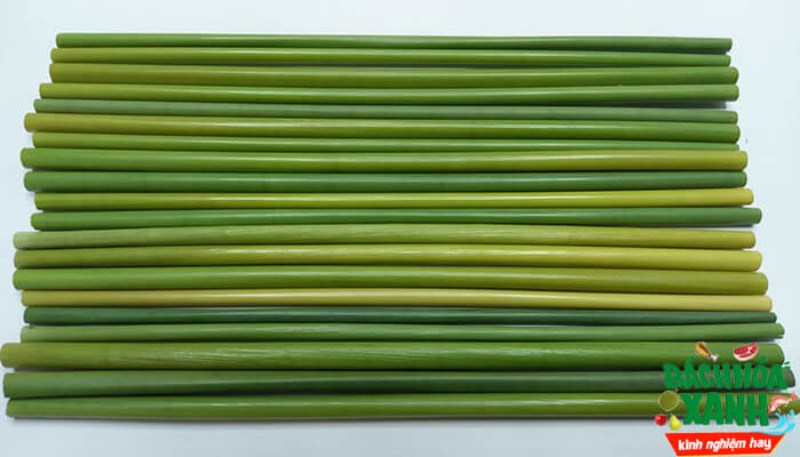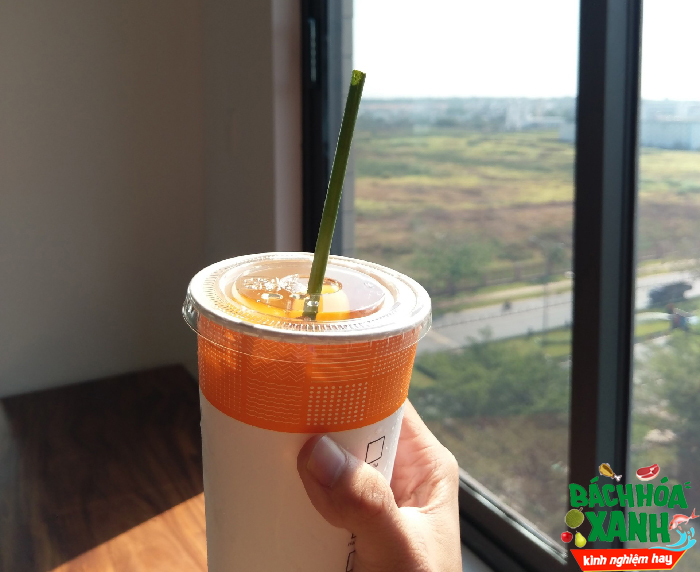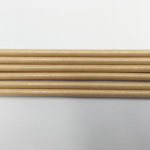The thrill of smoking stimulants is an indescribable rush that makes you want more. But this is about a different kind of grass, one that’s natural and unique to the Mekong Delta region of Vietnam. This grass is called Bang grass, and it’s making waves as a biological straw, aptly named the “grass straw.”
The grass straw is an innovative alternative to plastic straws, offering a more sustainable and eco-friendly option. As I learned from a Facebook friend who owns a weight-loss beverage business, these grass straws are a unique way to showcase environmental consciousness. Intrigued, I purchased 50 fresh and 50 dry grass straws to experience this novelty for myself.
1 Shape and Design
The grass straws retain the natural shape of the Bang grass, with a long, hollow stem. They are roughly 18cm long and 4.5mm in diameter, with both ends cut straight and one end sharpened for convenience. Due to their natural origin, the straws vary in size, with some larger and some smaller, but most fall on the larger side.

The design preserves the grass’s natural color and distinctive striations, adding a touch of rustic charm. When I tried it with my coffee, it looked incredibly cool and unique. While the shape may not be as sleek as other straw options, the grass straws offer an unparalleled, organic aesthetic.
Related: Discover more about the year 2023 and its significance.
2 User Experience
While the shape is intriguing, the true test lies in the user experience. I put the grass straws to the test with various beverages—sugarcane juice, milk coffee, and peach tea—and made some interesting observations. Both the fresh and dry grass straws imparted a subtle grassy aroma without overwhelming the flavors of the drinks.
This neutral scent is likely due to the absence of industrial processing in their manufacturing. The grass straws are crafted through a simple process: harvest, clean, cut to size, and optionally dry, resulting in a product that is ready for immediate use.
Related: Explore the history and themes of the 5/6 holiday.

One of the most impressive features is their durability. Unlike paper or rice straws that disintegrate after a short time in liquid, the grass straws, whether fresh or dry, last an entire day without compromising their integrity.

3 Considerations and Limitations
While grass straws offer an eco-friendly alternative, there are a few considerations to keep in mind. Firstly, proper storage is essential; the grass straws should be kept in the refrigerator to prolong their lifespan. According to the manufacturer, fresh grass straws last 2–3 days at room temperature and up to 2–3 weeks in the fridge, while dry grass straws have a six-month shelf life when stored in a cool, dry place.
Additionally, the grass straws are prone to breakage, as I discovered when stirring my drink through the plastic lid. Their size and design may also be a limitation for those who prefer a more modern or minimalist look, as the natural shape and style of the grass straws cannot be altered.
The grass straws are also somewhat expensive compared to other biodegradable options, but as environmental awareness grows, we can expect the price to become more accessible.
For more insights, explore our article on the history and significance of the year 2023.
In conclusion, my experience with grass straws has been eye-opening. They offer a truly eco-friendly and healthy alternative to traditional straws, and their production process is as natural as it gets. While there are some limitations, the grass straws’ unique appeal and environmental benefits make them worth considering.
Stay tuned for more interesting reads!
The Eco-Friendly Straw Review: Exploring the Pros and Cons of Alternative Straw Options
The harmful effects of plastic straws on the environment have led to a surge in alternative options. From paper to bamboo, these eco-friendly straws are revolutionizing the way we sip. Let’s dive into the world of sustainable sipping and explore the variety of alternatives available, along with their pros and cons, to make an informed choice for a greener planet.


































